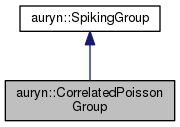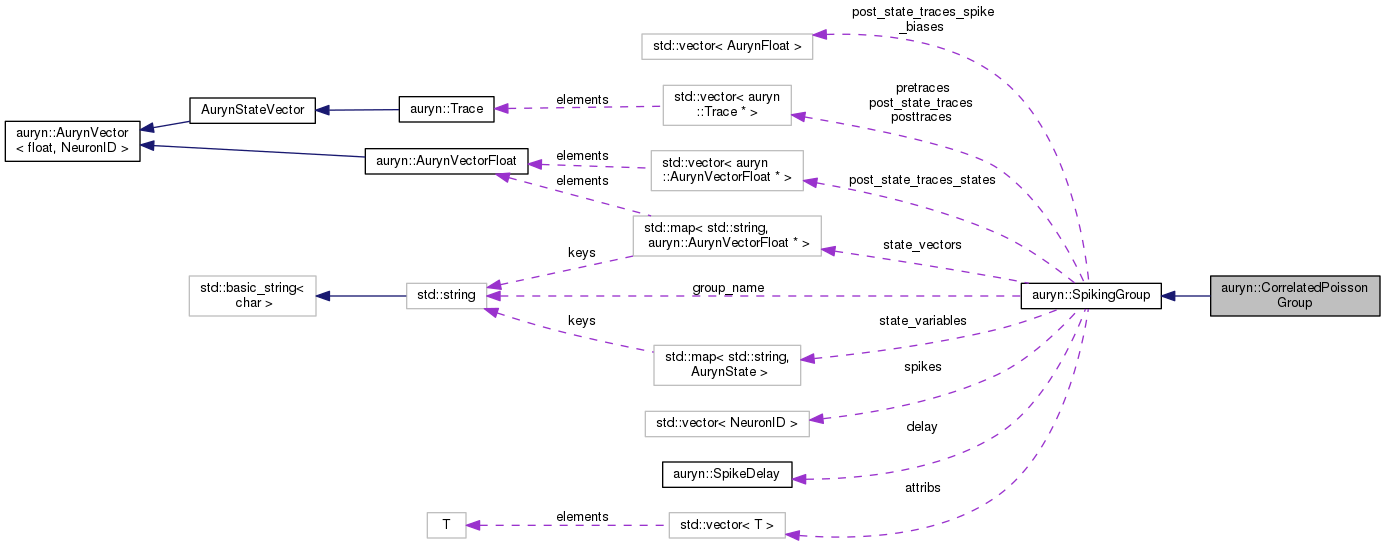|
| | CorrelatedPoissonGroup (NeuronID n, AurynDouble rate=5., NeuronID gsize=100, AurynDouble timedelay=50e-3) |
| |
| virtual | ~CorrelatedPoissonGroup () |
| |
| virtual void | evolve () |
| | Virtual pure evolve function which needs to be implemented by derived classes. More...
|
| |
| void | set_rate (AurynDouble rate) |
| |
| void | set_amplitude (AurynDouble ampl) |
| |
| void | set_target_amplitude (AurynDouble ampl) |
| |
| void | set_tau_amplitude (AurynDouble scale) |
| |
| void | set_timescale (AurynDouble scale) |
| |
| void | set_offset (int off) |
| |
| void | set_threshold (AurynDouble threshold) |
| |
| void | set_stoptime (AurynDouble stoptime) |
| |
| AurynDouble | get_rate () |
| |
| void | seed () |
| |
| void | add_state_vector (std::string key, AurynStateVector *state_vector) |
| | Adds a state vector passed as an argument to the dictinary. More...
|
| |
| void | remove_state_vector (std::string key) |
| | Removes a state vector passed as an argument to the dictinary. More...
|
| |
| AurynStateVector * | find_state_vector (std::string key) |
| | Returns existing state vector by name or NULL if it does not exist. More...
|
| |
| AurynStateVector * | get_state_vector (std::string key) |
| | Creates a new or returns an existing state vector by name. More...
|
| |
| AurynStateVector * | get_existing_state_vector (std::string key) |
| | Returns an existing state with the supplied name. More...
|
| |
| AurynStateVector * | create_state_vector (std::string key) |
| | Creates a new state vector and throws an exception if a vector with the same name exists. More...
|
| |
| AurynState * | get_state_variable (std::string key) |
| | Creates a new group-wide state variable or returns an existing group-wide variable by name then returns a pointer to it. More...
|
| |
| void | randomize_state_vector_gauss (std::string state_vector_name, AurynState mean, AurynState sigma, int seed=12239) |
| | Randomizes the content of a state vector with Gaussian random numbers. Seeding is MPI save. More...
|
| |
| | SpikingGroup (NeuronID size, NodeDistributionMode mode=AUTO) |
| | Default constructor. More...
|
| |
| virtual | ~SpikingGroup () |
| | Default destructor. More...
|
| |
| virtual void | evolve_traces () |
| | Evolves traces. More...
|
| |
| void | set_name (std::string s) |
| | Set connection name. More...
|
| |
| std::string | get_name () |
| | Retrieves the groups name. More...
|
| |
| std::string | get_file_name () |
| | Extracts the class name of the connection from the file name. More...
|
| |
| std::string | get_log_name () |
| | Returns a string which is the combination of file and connection name for logging. More...
|
| |
| void | inc_num_spike_attributes (int x) |
| | Instructs SpikingGroup to increase the number of spike attributes by x. More...
|
| |
| int | get_num_spike_attributes () |
| |
| void | conditional_evolve () |
| | Conditional evolve functino which is called by System. More...
|
| |
| unsigned int | get_locked_rank () |
| | Returns locked rank for SpikingGroups which are not distributed across all ranks. More...
|
| |
| unsigned int | get_locked_range () |
| | Returns locked range of ranks for SpikingGroups which are not distributed across all ranks. More...
|
| |
| SpikeContainer * | get_spikes () |
| | Returns pointer to a spike container that contains spikes which arrive in this timestep from all neurons in this group. More...
|
| |
| SpikeContainer * | get_spikes_immediate () |
| | Returns pointer to SpikeContainer of spikes generated during the last evolve() step. More...
|
| |
| AttributeContainer * | get_attributes () |
| | Returns pointer to Attributecontainer for usage in propagating Connection objects. Same as get_spikes_immediate(), however might be overwritten to contain Spikes that have been delayed. More...
|
| |
| AttributeContainer * | get_attributes_immediate () |
| | Returns pointer to Attributecontainer of spikes generated during the last evolve() step. More...
|
| |
| NeuronID | get_size () |
| | Returns the size of the group. More...
|
| |
| NeuronID | get_pre_size () |
| | Returns the size of the group. More...
|
| |
| NeuronID | calculate_rank_size (int rank=-1) |
| | Determines rank size and stores it in local variable. More...
|
| |
| NeuronID | get_rank_size () |
| | Returns the size on this rank. More...
|
| |
| NeuronID | get_post_size () |
| | Returns the size on this rank. More...
|
| |
| void | set_clock_ptr (AurynTime *clock) |
| |
| bool | evolve_locally () |
| | Returns true if the calling instance has units which are integrated on the current rank. More...
|
| |
| NeuronID | get_uid () |
| | Get the unique ID of the class. More...
|
| |
| Trace * | get_pre_trace (AurynFloat x) |
| | Returns a pre trace with time constant x. More...
|
| |
| void | add_pre_trace (Trace *tr) |
| | Adds trace to pretrace stack of a connection. More...
|
| |
| Trace * | get_post_trace (AurynFloat x) |
| | Returns a post trace with time constant x. More...
|
| |
| void | add_post_trace (Trace *tr) |
| | Adds trace to posttrace stack of a connection. More...
|
| |
| void | push_spike (NeuronID spike) |
| | Pushes a local NeuronID as spike into the axonal SpikeDelay buffer. More...
|
| |
| void | push_attribute (AurynFloat attrib) |
| | Pushes a spike attribute into the axonal SpikeDelay buffer. More...
|
| |
| void | clear_spikes () |
| | Clears all spikes stored in the delays which is useful to reset a network during runtime. More...
|
| |
| Trace * | get_post_state_trace (std::string state_name="mem", AurynFloat tau=10e-3, AurynFloat b=0.0) |
| | Returns a post trace of a neuronal state variable e.g. the membrane potential with time constant tau. More...
|
| |
| Trace * | get_post_state_trace (AurynStateVector *state, AurynFloat tau=10e-3, AurynFloat b=0.0) |
| | Returns a post trace of a neuronal state variable specified by pointer. More...
|
| |
| void | set_delay (int d) |
| | Sets axonal delay for this SpikingGroup. More...
|
| |
| virtual bool | write_to_file (const char *filename) |
| | Writes current states of SpikingGroup to human-readible textfile if implemented in derived class. More...
|
| |
| virtual bool | load_from_file (const char *filename) |
| | Reads current states of SpikingGroup to human-readible textfile if implemented in derived class. More...
|
| |
| NeuronID | ranksize () |
| | Returns size (num of neurons) on the current rank. More...
|
| |
| NeuronID | global2rank (NeuronID i) |
| | Converts global NeuronID within the SpikingGroup to the local NeuronID on this rank. More...
|
| |
| NeuronID | rank2global (NeuronID i) |
| | Converts local NeuronID from the local rank to a global NeuronID. More...
|
| |
| bool | localrank (NeuronID i) |
| | Checks if the global NeuronID i is integrated on this MPI rank. More...
|
| |
| NeuronID | get_vector_size () |
| | Rank size but rounded up to multiples of 4 (or potentially some other and larger number in future versions) for SSE compatibility. More...
|
| |
A PoissonGroup with multiple subpopulations that co-modulate their firing rate according to an Ornstein Uhlenbeck process.
The group can be used to provide a stimulus for Hebbian learning in networks. When defined a given number of groups of given size are defined, as well as a correlation time.




 Public Member Functions inherited from auryn::SpikingGroup
Public Member Functions inherited from auryn::SpikingGroup Public Attributes inherited from auryn::SpikingGroup
Public Attributes inherited from auryn::SpikingGroup Protected Attributes inherited from auryn::SpikingGroup
Protected Attributes inherited from auryn::SpikingGroup Protected Member Functions inherited from auryn::SpikingGroup
Protected Member Functions inherited from auryn::SpikingGroup Static Protected Attributes inherited from auryn::SpikingGroup
Static Protected Attributes inherited from auryn::SpikingGroup








 1.8.13
1.8.13